Fans of Depeche Mode have a chance of continue the party listening to his favorite band at Bar Loose in Helsinki on 02.02.2010. DEPECHE MODE AFTERPARTY will start at 23:00, and the Ocean plays special cover set + Dj’s play DM.
For more information and buying tickets for the show, visit: www.tiketti.fi
Swedish Backyard Barbies at Tavastia
The popular Swedish rock band will play at Tavastia Club in Helsinki the 23rd of January.
For more information and buying tickets for the show, visit: www.tiketti.fi
Interview with Jani Penttinen – CEO and co-founder of XIHA Life
Jani Penttinen: the Finnish who knows how to make friends!
Jani Penttinen is clearly not the kind of man who likes sitting all the evening at home watching TV and killing time. His mind seems to be always looking for new challenges and possibilities to explore, both in his private and working life. This has led him to live in 3 different foreign countries through the past years, work for some of the most acclaimed videogame developers in the world and create from scratch his own social network online, XIHA Life, together with his Chinese wife Wen. A project that continues growing day after day with new members that share common features: their passion in making new friends from all over the world, traveling and getting to know new cultures and languages. Let’s discover a bit more about this young Finnish entrepreneur who seems to disregard the word “impossible” from his vocabulary…
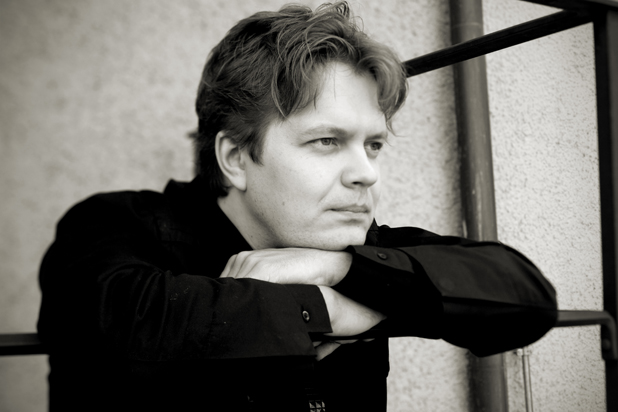
Thanks a lot for attending our questions Jani! Please tell us more in detail what exactly XIHA Life is and how the idea came up for its creation.
Short and sweet, XIHA Life (www.xihalife.com) is a multilingual lifestyle community for anyone interested in other cultures or languages. It’s a relaxed community where people make friends and learn about life in other places of the world, or just have fun and play some games.
How many members does XIHA have nowadays and which are the countries with biggest representation?
As of this moment we have 525 796 members and over 1000 new members sign up every day. It’s not easy to say which country is number one, because the distribution is very flat and the top countries change almost daily, however Thailand, Turkey, Brazil, Poland, China and France are the countries usually at the top.
One of the strongest points of XIHA is being so multicultural. In how many languages is translated? Are you planning to add more?
The user interface has been translated to 42 languages and we currently support 56 languages for the content. Unfortunately many of the translations are a little out of date now as the whole year we’ve been busy adding new features and changing things around. We’re planning to soon get all the languages updated and then add some more. I think in the end we’ll have more than 100 languages, as we really want to offer the service in native language to almost everyone in the world. In fact, nothing really stops us from having much more than that, if we just find some people to do the translations for us!
Before that, you were working in USA as programmer, among other companies with the famous Electronic Arts. How was the experience there, and what did you learn to apply it in your future projects?
It was a fantastic experience! I very much recommend everyone spend some time living and working in another country at some point of their life. For many it may sound scary to go abroad but it’s not that difficult. Life in the US is not that different from life in Finland; you eat, you sleep and you work! However, the big difference is in the attitude and the way of life. I think it was in the US when my entrepreneurial spirit fully took off. While technically I was working for a large corporation, EA, I was actually working at a small company called Westwood Studios in Las Vegas, which EA had acquired couple years earlier. The founders running the company had the kind of enthusiasm I’d never seen before. It was a great inspiration to work with them.
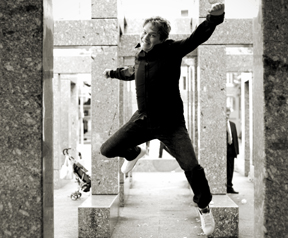
What was the motivation to move from there to China?
I left EA after they closed the studio in Las Vegas and asked me to move to Los Angeles. Vegas was a nice small city where everything was shiny new and I could afford living in a big house. Moving to LA would have meant paying more to live in a small apartment, in a crowded city, doing the same job I’d been doing for the past several years already. I’d already worked with some of the most legendary game developers on huge game titles, so I felt it was time for change. It was a crazy plan actually – I had never been to anywhere in Asia and I didn’t speak any Chinese. In fact, I knew absolutely nothing about China. I probably thought I knew something, but in the end it turned out how little we in the west know about the Asian countries… Anyway, off I went. In about three months I had a company up and running in Shenzhen with the first few employees hired!
Did you have in mind to create something like XIHA in the past years, or the inspiration came after meeting your wife Wen in China?
Yeah, definitely it was because of her, actually XIHA was her idea. In fact I never intended to stay in China. I had thought of starting up a satellite company in China or India and controlling the operations from Las Vegas. But meeting her changed everything – within just a few weeks I had already put my house for sale in the US and was preparing to move to China for good.
She’s from an entrepreneur family so she knew everything there is to know about running a business in China. It was because of her that starting the mobile business went so smoothly. Unfortunately though, running a software sweatshop in China was not what I had imagined and pretty soon I was looking for a change – again. It was at that point when we decided we would implement her idea of the XIHA Life community. It was meant to be just something fun we do together, but here we are, 3 years later, both running it as the full time job!
“I see XIHA becoming a well-known brand around the world”
How is to work together with your wife? Is the relation cool, or sometimes it is difficult to mix family and business?
Sometimes it’s pretty cool, but in the end it’s actually quite difficult. It’s hard to escape work when you have your own company, and it gets practically impossible when you’re running the company together with your wife. This is sometimes quite a strain on the relationship. Having a family business obviously has a lot of advantages too and I really like the fact I can build my schedule so that I work from home as much as possible. When your business partner is a family member, you have way less conflicts of interest when making decisions.
Do you have any fixed office for XIHA, or basically your work using the computers and Internet?
XIHA is has a virtual office – everyone works from their home or anywhere else they see fit. All our team members are professionals who love their job, so this works very well. Rather than checking the clock on how many hours everyone puts in, we care about what gets done. Quite naturally it fits my lifestyle – during the life span of XIHA I have already lived in three different countries. This arrangement also gives me more freedom to not just move around the globe but also work while traveling. In the summer we sometimes like to cruise on a boat across Lake Zurich. There are small towns around the lake, so the 3G coverage is excellent. I can basically stay online and work all time.

What are the main features that make XIHA different from other social networks such as Facebook or MySpace?
The biggest difference is that we’re an open community where you make new friendships, often from the other side of the world. So while you probably have all your existing friends in Facebook, that won’t help you much if you want to talk to locals at your next travel destination, or if you want to learn a new language. If you just want to check out what your old buddies are up to, probably XIHA won’t be very interesting to you. But on the other hand, you probably would not contribute much useful stuff to XIHA either, so it’d be a mutual mismatch. What we’re trying to build is not the biggest community in the world, but instead the best hangout for like-minded people.
What are the main sources of profit for XIHA? Are the games the most important part to sustain the network economically? Do you develop your own games, or are made by third party companies?
Games are an important part of our revenue model. Part of the reason is my background in games industry, but in general the types of casual games we offer are a very good fit to our audience. Most of the XIHA users are girls or women, from 25 to 50 years old, and this group just happens to love playing games on the internet. We don’t develop games, we’re basically a reseller. What makes our offering special compared to many others is that our users can pay for the games in their local currency and local payment systems. For example in Finland you can buy a game from us and pay for it through your own online bank, and get the game instantly. With this idea we’re taking the localization one step further – it’s not enough to translate the text, we also want to localize the entire user experience.
Is XIHA profitable? Are you thinking to implement new ideas profit-oriented?
Nope, it’s not profitable yet. In fact, we haven’t really focused on monetizing yet. We could run the service itself at profit but we are investing into development of the service. Our number one goal has been to build an excellent network where people have fun and want to keep coming back. Without that there’s not much point in thinking of how to make money, really. We’re in a good shape though, things are progressing as planned.
Are you dedicated professionally full time to XIHA, or do you participate in other side jobs?
Both Wen and I are 100% focused on XIHA. In addition to us, we also have 3 full time developers working on the project and around 10 part-timers. Early on, when XIHA was just a hobby, I was still doing some gigs for EA, participating in development of some really cool games. Unfortunately I don’t have time for that anymore.
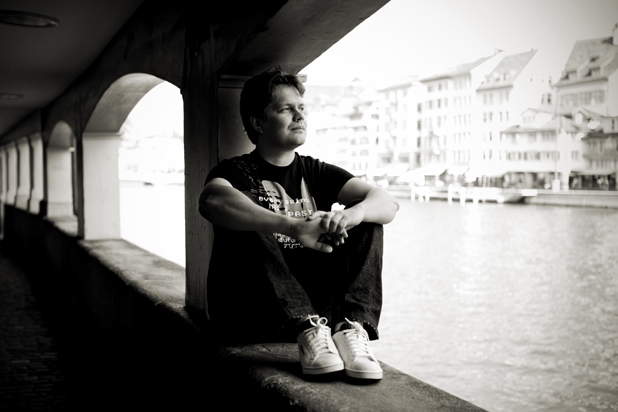
How do you see the future of XIHA Life, and what are the main challenges to face?
I see XIHA Life becoming a well-known brand around the world for cross-cultural communication. It will be something people use in addition to other social networks, so no matter who is the leader and what the trends are, XIHA will have the staying power and will keep on thriving.
Anything you want to add for our readers?
I’d like to invite everyone to try out XIHA Life. It’s completely free to use and we have plenty of fun and friendly people around. Given that XIHA is targeted at expats and travelers, I think it would be a great fit for many of the readers!
For joining the XIHA experience and make friends from all over the world, you can visit:
www.xihalife.com
Photos by Marianne Taylor
Under construction!
Due to an upgrade of our design during the first weeks of 2010, FREE! Magazine website could experience some technical problems when trying to load the pages. We are working to fix it as soon as possible hoping you can fully enjoy our contents and new features! Thanks for your patience.
Hanoi Rocks – Buried Alive
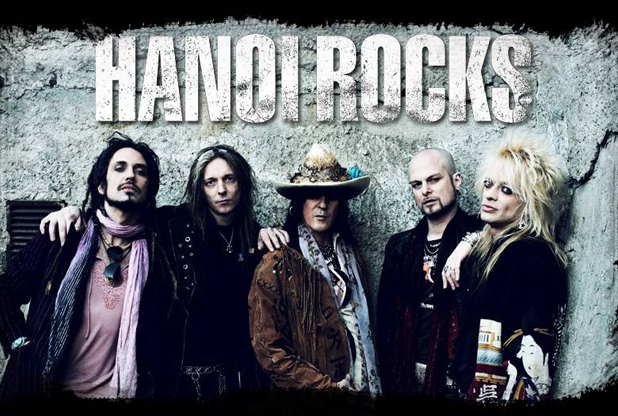
Shot at Tavastia Club on April 12th 2009, this live concert is the last one by the mythical Finnish rock band Hanoi Rocks. If you are a fan of Finnish rock, and basically of rock history in general, you cannot miss this DVD with the last show of Hanoi Rocks not only in Finland, but as a whole band before parting ways. Monroe, McCoy and their Swedish younger fellas give a great lesson of rock & roll with an astonishing set list where songs from the newer albums get mixed with classics like Tragedy, the opening track.
Although Tavastia Club is maybe a bit too small for filming this kind of big farewell concerts, and the same time, it is emotive to see the packed audience totally adoring their idols in the most famous rock club of Finland; people there cannot refrain tears in their eyes in songs like Don´t You Ever Leave Me. Same that with the members of the bands, also Hanoi Rocks has been able to find a great balance between old and young followers.
As a climax, everybody including old members Nasty Suicide and Lacu share stage to play a kick ass version of Up Around the Bend and say goodbye (or maybe see you later) to a great career for one band that has already entered the history of rock.
The DVD also features a short documentary of 12 minutes, but basically, it does not add much to the package, except for taking a look at the painted walls of Tavastia Club´s backstage. The members of the band record some footage with handy cams, but you can see that everything is a bit “forced” and they are not really happy recording or putting much effort into it.
All in all, a good product to add to your collection if you are a Hanoi Rocks fan, as well as if you want to see one good piece of rock history very alive before getting buried!
Rating 3/5
Related articles:
Interview with Hanoi Rocks:
http://www.freemagazine.fi/content/view/225/152/
Review of Street Poetry:
http://www.freemagazine.fi/content/view/355/152/
Interview with Jukka of Deep Insight
Deep Insight is on a rampage! After releasing their kick ass album Sucker for Love and receiving the MTV award to the best Finnish band, they are going through probably the sweetest moments of their careers. Jukka, their vocalist, attended kindly our questions and explains how after a huge effort and tones of sweat, the bright side of rock is smiling at them.
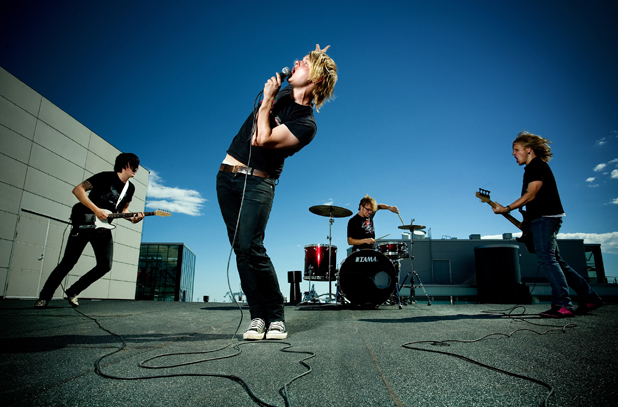
Hello and thanks a lot for your time. If you would have to describe to a new listener how your latest album, Sucker for Love, sound, how would you picture it and your style?
The record cover represents the album very well. We ripped our chests open to give everything we have to make this album. It’s all there in those 11 songs.
You have recently be awarded with the best Finnish band MTV prize. Are you satisfied with it, or you do not give much importance to the prizes and awards?
We’re extremely happy about the award! Thanks to all of our fans for voting!!!
By the way, I noticed that the album is dedicated to Lucas. Has any member of the band be father recently?
Lucas was the work title for our producers’ child. He was born the same week our record was released.
I fancy a lot the artwork of the cover. Was it specifically designed for your album?
Thanks, that’s so nice to hear. The Lego man is a sculpture made by an American artist Anthony Sawaya. He was happy to give the picture for us to use our record cover.
“Many times outgoing people are keeping a mask in front of the real personality.”
Tell us a bit please how you got to know each other and started to play music together as a band?
Me and Johannes have been BFF’s as long as I remember. One day in sauna we started talking about having a band. First it was supposed to be an acoustic project, but already at the first rehearsals we had a drummer and a bass player join us.
Can you nowadays live on just playing music, or do you have other jobs/activities apart from the band?
It’s still difficult to make ends meet with just playing music, but it’s getting better all the time. When we tour there’s nothing else in our lives then the band.
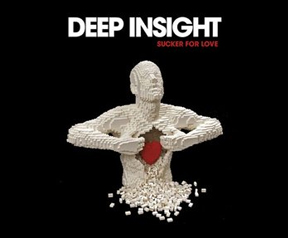
The band, starting from the name, puts special attention in showing that appearances are sometimes deceptive and what matters is the inside of people. But how do you feel with that idea in Finland, when people seem a bit introverted? Is it not difficult sometimes to get to know the inside of people when they are shy or keep distances?
I feel that it’s easier to get to know people if they are slightly introverted. It takes a little effort to break the ice, and once you get through, you see the real person. Many times outgoing people are keeping a mask in front of the real personality.
It seems that nowadays every 1 of 3 guys in Finland plays in a band, the new number of bands releasing rock albums is amazing. Is this healthy for the industry, or does it make the market very tough to breakthrough?
I think it’s always been the same. New bands pop out like mushrooms in the rain. I consider a band to be a band after it’s released at least 2 albums or have been together for 3 years. These are the minimum requirements!
What are your future plans for the end of the year and beginning of 2010?
We just finished our tour on the 18 of December and now we have two months holiday for writing new material.
Anything you want to add for the readers?
Keep it real!
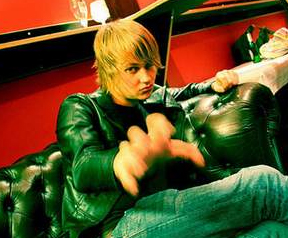
Q&A with Jukka
Favorite place you have played so far?
The Roxy / L.A.
Best memory on stage or backstage?
Too many to good memories on and off stage.
Best band as a partner to tour with?
The 69 Eyes, The Rasmus, Man Alive… all of them.
If they would offer you to play in a country or festival you have not been yet, which one would you choose?
Headlining the Warped tour.
Finnish vodka or Finnish coffee as recommended drink?
Whatever is your taste. Both of them are superb!
If for chances of destiny you would not play in Deep Insight, is there any other band you would like to be part of?
Coldplay
Related articles – Review of Sucker for Love:
http://www.freemagazine.fi/deep-insight-sucker-for-love/
Photos by Mika Lakanen, Erne Hakala and Jari Kääriäinen.
For more information about the band, visit:
http://www.myspace.com/deepinsight
Interview with The Jade
The Jade is probably one of the most exciting new rock Finnish bands that you can listen to nowadays! Building up their reputation in the past years with amazing songs and hard work, they finally have been able to please the big community of fans they gather all over the world with their first studio album: Seconds Away from Salvation. All the members of the band kindly participated in this interview where they show that, apart from great musicians, they are friendly easy going guys!
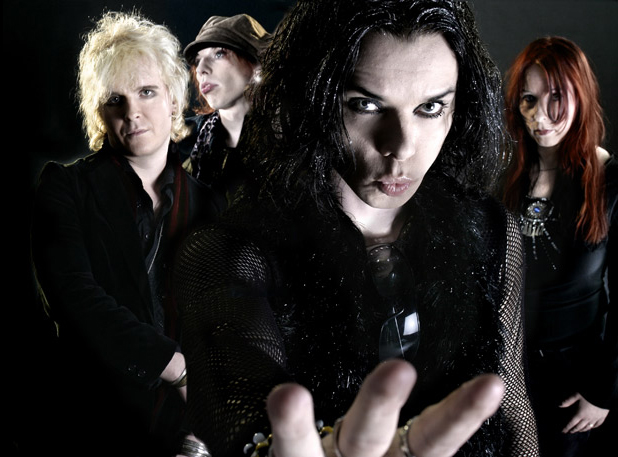
Thanks a lot for your attention guys! You have finally an album in the streets, Seconds Away from Salvation. For a listener who would approach your band for first time, how would you define your style?
Wille: If you want great melodies and lyrics with a sincere depth of consciousness of the mind, and your taste of music is somewhat rock-oriented; this album is the way to go. We are not like the other bands you have been listening before. The Jade is absolutely a unique band, but people can also hear familiar aspects in our music. Therefore, your style could also be mainstream. Spend an evening with us in the pubs and you’ll know what I’m talking about when I say we have four individuals in The Jade.
Pekko: Thank you! I’d say it is a heart full of melodic rock’n’roll, a fistful of punk, another fistful of metal with dashes of pop. Words about life, death, hope, desperation, faith, anger, solitude, love and mental health.
Jann: Yes, well the guys pretty much nailed it down so there’s not much to add. I think it’s timeless rock’n’roll with real life lyrics. Great tunes and we flirt with the darker side.
Do you have any favorite track in the album?
Wille: I love them all.
Pekko: Same here.
Sirpa: Me too. If I have to pick one, it’s Solitary Soul.
Jann: That seem to change about everyday but right now I’m loving Wake Up, Roses Are Burning, Yesterday’s Rain and Solitary Soul. Listen to the Solitary Soul when we’re going to the solo part, it’s just pure art. And yes, Beautiful Things is my favorite. At the moment as well. There’s a little hidden message in that song and it’s not in the lyrics. I’d like to meet a person who picks it up. I love things like that.
Let’s jump back in the past. Can you explain a bit how did you meet all of you to form the band?
Wille: Jann and Pekko had an ad on the internet where they were looking for a lead singer and then I replied to it. That usually never happens, but I noticed the first time we met that the guys were good song writers. We didn’t have a drummer in the first few months, but since we all knew Sirpa and she was eager to join; she was a clear choice to us.
Pekko: At the first time we played some cover songs with Wille and we noticed right away that he has got a very good clear, boyish and sharp voice and there were good vibes around. Usually when some one new comes around for jamming for the first time the situation might be slightly uncomfortable but that time it wasn’t.
Jann: Yes, I remember when Wille came and he sang Alice Coopers’ I’m 18 and it was just unbelievable. He also played acoustic guitar which was extra. I thought this guy has the voice, the range and he’s musical, so gotta check out what’s gonna happen with him. I have no regrets. There was some kinda Mick Jagger meets Steven Tyler thing going on with his vocals.
If I am not mistaken, some of you were living previously abroad in England. What made you come back to Finland? It seems that Finns sometimes have a love-hate relation with their country, they complain about it a lot, but when they go abroad, they end up coming back to their roots. Did that apply for you?
Pekko: Yes, it was same thing for me. I was fed up living in such a small town as Joensuu is, as I was quite young. During those years spent in London I grew up and realized where I belong. Moving to Helsinki was not an easy choice but that time it was the only option. I’m very glad for it now. For me living in London was very tough and I don’t miss that part of my life at all. I have some good and weird memories of that period, though.
Sirpa: I totally agree with that. I remember complaining a lot about everything of Finland before I moved from here. It did not take long time to realize that life was not actually that different somewhere else. You still do same routines. Anyways I’m glad I left couse it opened my eyes and I learnt a lot over there. Decision to move back to Finland was easy. I guess the reason to move back was that there simply was not anything interesting for me anymore.
Jann: I was born in Helsinki but parents dragged me to Joensuu when I was kid. The town really sucked. I was getting beaten up every weekend because of my looks, so I thought yeah, I’m gonna get the fuck outta here. It wasn’t to escape, if I wanted that I would changed the way I dressed. But a boring place filled with rednecks didn’t sound as good as London. I have no regrets. Anyhow, moving back from London was a clear decision. After one of my best local friends passed away something was clearly missing. It was kinda end of an era, maybe you have those in life. I dunno, I just try to follow what my heart, which was the feeling at the time. Still, I do have some good memories as well. I met great people and got to play in some interesting venues and got to know and meet some musicians that I dig.
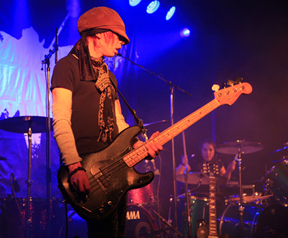
I see that some of the songs that appeared in your EP were included in the CD. Did the EP help you a lot to get a record deal?
Wille: The first one did not, but the second one called Slow Motions On The Fast Lanes helped us to get a record deal. That EP was the cd that inspired the label North & South to sign us. The record chief Kari Kallonen came to see our show in Tampere and was enough impressed to sign us. Before that gig he had heard Slow Motions, which we had sent to him.
Pekko: Yes, Kallonen liked the songs on the Slow Motions On The Fast Lanes and signed us after the gig. He had not even seen our sites before. So when we together chose the songs for the Seconds Away From Salvation we all thought it would be very natural to make updated versions of the certain songs in the very good studio with great producers.
Jann: Yes, the songs are your babies and you want the best for them. So we were lucky to have a chance to go to the Seawolf Studios. It’s a great place and the guys over there are great as well, very professional. Well, they’re also members of Havana Black so it was a pleasure to work with them really. Major Leiden Team rocks!
As well, for a band that some years ago did not have a CD yet in the streets, you managed to build up a big community of followers through Internet. Do you think that it would have been more difficult to spread the voice without the new technologies?
Wille: Of course. In these days, internet is a very big part of the band promotion strategy. It’s the only media that can reach such a huge amount of people globally compared to other ways such as TV or radio. Almost every other advertising choice cost more.
Jann: And it’s a different kind of channel. Let’s say that the people aren’t that manipulated via internet so if you catch someone’s attention over there, I think it’s a good sign. You know, like people have 8 zillion bands there while on the radio or tv you’ll see or hear something between 20 and 100. Personally I have found some great acts via net, and I’m not only talking about porn, it’s fascinating.
Wille: Patience and consistent work for your dreams is the key!
Are you active users of Internet and do you have time to be in contact with the followers of the band personally?
Wille: We try as much as possible to answer emails that we get, but sometimes we just have to prioritize, because we always have so much to do.
Pekko: I like to be in touch with our friends who like the music we play. We definitely do our best to talk to the people. It’s really precious that there are still active friends who have been around since the first ep, Heatwave, was released.
Jann: We do our best, quite a lot on official sites. Then again on my own site I’m sometimes a bit lazy, well not lazy, but I’m a cancer in a horoscope and sometimes cancers just wonder, I wonder. Well, the time is limited.
What do you do when not playing music? Do you have other daily jobs, or hobbies?
Wille: I think everybody does also something else to survive or to get an inspiration from, whether it’s movies or walking in the park or drinking beer in pubs. Still, music is the soundtrack of my life. All my dear memories hold the thought of great songs that I have listened with passion.
Pekko: Music and everything around music takes most of the time but that is just a good thing. The day job helps to pay the bills. Not always, though…
Sirpa: Well I don’t have any hobbies what I do regularly. Watching movies is best way to relax. And yes, day job is something you do to pay the expenses.
Jann: I don’t have a job, I’m on a dole. I’m interested about different things. I have some hobbies like decathlon. Sometimes I read books, poetry, watch documentaries and go to see the gigs at times. I also keep checking out different bands via net. Write poems at times, watch Capri, I wonder what’s gonna happen to Totó, you know the usual…
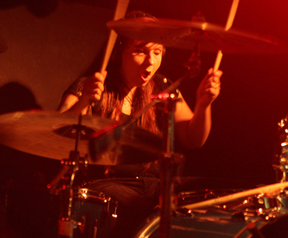
For you, your dream of climbing higher in the musical scene is getting closer. What advice could you give to all those new bands that try to breakthrough?
Wille: There are no quick routes to the top. Patience and consistent work for your dreams is the key.
Pekko: Spend long hours rehearsing. Especially during the first years. Don’t get too wasted while rehearsing. Or on the stage.
Sirpa: Enjoy what you are doing and don’t give up.
Jann: Well, I don’t feel that I’m a right kind of person to give advice as everyone have their own routes to wherever they’re goin’ but something like: don’t play it safe, play it from the heart, play like you mean it and get along. Get deals checked and join your local musicians union –they’re on your side. Main thing, enjoy the music itself.
Is it especially difficult for a new band to catch attention in Finland (being a country where seems that every 1 of 3 guys plays in a band), or otherwise it is easier due to an industry well settled?
Wille: It ain’t easy to get the attention if you don’t have the right connections with the right people. Not all of my friends play in a band. Not even 1 out of 3. There are many bands out here. However, I believe we have room for everybody.
Pekko: Not easy at all. Finland still is “The Bandland”. Yet we do work hard to spread the word around so that’s why I believe it is possible. But if you sit around and wait something to happen it’s very likely that nothing will happen.
Jann: I think it changes. Some get attention fairly soon and some later. Also some bands just vanish and some keep on rocking. So it kind of depends, you know. But yes, if you sit at home no-one’s goin’ to find you. Who knows? We’ve been lucky enough to gain interest from abroad and that’s great.
What are your future plans for the end of the year and for 2010?
Wille: We will probably make another video and single. Also doing gigs and we will let you know as soon as we know more about the future. There is one cool thing coming for us in the near future. Can’t talk about it yet, though.
Pekko: We are certainly hoping to find a good booking agent. That is the priority.
Jann: And finding a capable manager is what we’re looking for as well. The one who really does his or hers job. Not one of these who just go: This and that will happen and then they’ll do fuck all. I’ve seen those all my life and it really makes me puke. To get a great team behind us would be cool. But hey the New Year starts like it should. On the 1st of January we’ll play at Gloria here in Helsinki. There’s a great event with quite a many interesting bands so it’s a nice start. Let’s see what the life brings. Keep on doin’ not planning that’s the thing. In the end, heaven knows where it leads.
Anything you want to add for the readers?
Wille: The album Seconds Away From Salvation is out now in almost ten European countries. I’m sure you will love it as much as we do. It’s from the heart and you can order it also to your country, if you don’t happen to live in Europe.
Pekko: From the heart and soul. Seconds Away From Salvation.
Jann: R’nrolls!!
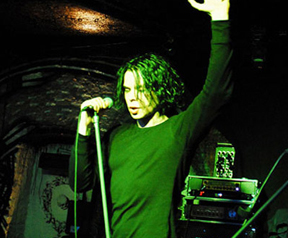
Q&A with The Jade
Favorite concert you have watched recently as spectators?
Wille: Dingo at Pressa was the latest.
Pekko: Matthau Mikojan in June at Liberte. I like what they are doing. I don’t go to see the gigs very often.
Sirpa: Hmm… That’s quite a long time I have been in concert. Aerosmith few years back in Helsinki was absolutely amazing.
Jann: Hanoi Rocks at Tavastia, their farewell shows in Helsinki. They played there maybe 9 days in a row. I saw the Friday show, it was just awesome. My all time favorite band.
Best band to share stage or tour with?
Wille: U2.
Pekko: Foo Fighters, My Chemical Romance, 69 Eyes and Matthau Mikojan.
Sirpa: My Chemical Romance, Linkin Park and Nightwish.
Jann: Hard to say as there are at least 100 that would be interesting. I have a m-day: Michael Monroe, Manic Street Preachers, Motley Crue and Matthau. Ok, I think Uniklubi and Apocalyptica would be cool too. And Negative. Then again I’m always happy to share a stage with most bands.
Best venue to play in Finland? And abroad?
Wille: Blue Shell in Cologne Germany was cool. In Finland, I liked Gloria in Helsinki.
Pekko: Fourooms in Leipzig. The stage is not big but the atmosphere is something very special. In Finland, I’d say On The Rocks.
Sirpa: In Finland Semifinal and abroad Wild and Heart in Berlin.
Jann: Well I usually feel comfortable to play anywhere as I love playing live. If I have to name some let’s say that Logo in Germany is great. The Garage downstairs and Dingwalls in London were good. And over here I really dig Klubi, Tampere.
Place or country you would love to visit and play there, but still did not have the chance?
Wille: Every damn country on the face of the planet is fine with me as long as there are eager fans to see us. My dream is to tour in Asia and South and North America in the future.
Pekko: Same here. Especially in Mexico and Japan.
Sirpa: Anywhere would do!
Jann: Many places actually. I’m interested to see and experience new places. Tokyo, and Japan in general for example. Far East and the States for sure. Also we haven’t been to Russia and Eastern Europe and I’d love to tour there. But of course it would be just great to tour all around the world.
What community of fans is the most active around the world?
Wille: I believe South America has the most passionate fans even though I have never visited the continent before. It’s in their culture to express emotions in a very open manner.
Pekko: Friends from Germany, Japan and Mexico, I think.
Jann: I dunno. Hmm… Not sure, I’ve been getting quite a lot of mails from the States, Japan and Germany lately. Maybe those…
Best moment on stage?
Wille: On stage, it’s when people are singing along the words to our songs and when you see the happy faces in the audience. It´s also fun to take pictures with fans and sign autographs.
Pekko: Every moment on stage is special. The best feeling is when after the gig there are no clear memories. It means that there has been state of trance again. And to get into that state you only need the music.
Sirpa: Beginning of the gig when there is that certain excitement going on.
Jann: It’s a great feeling when the adrenaline rush hits you like a rocket. For some reason on stage I feel that I’m finally home.
What would be the first sentence in Finnish you would teach to a foreigner?
Wille: Suomi on surullisten laulujen maa. (Finland is the country of sad songs)
Pekko: For this one I have to quote one of my favoutrite Finnish songwriters, Ismo Alanko. The sentence goes "Syksyisen metsän luurangot ovat nöyrinä hiljaa" (Skeletons of autumn forest are humbly silent). I’m not sure if it’s any useful but beautiful line of Finnish language it is for sure.
Sirpa: Askel kerrallaan portaita kiivetään. (Step by step climbing the stairs)
Jann: Elämä on laiffii. (Life is life by Matti Nykänen)
For more information on The Jade, visit:
http://www.thejade.fi/
http://www.myspaace.com/thejadenet
Interview with Matt & Kim
Music is basically all about having fun and getting transported to a new world of feelings and emotions. Americans Matt & Kim know a couple of things about that. Their live shows turn into a big party, and with their second studio album, Grand, they have just made their international breakthrough. They will be playing on December a mini tour of 5 gigs around Finland, country that they visit first time, and FREE! Magazine had the chance to talk on the phone with Matt. I have heard that these guys are pretty easy going and friendly, and I can assure that it is totally true. Matt is a real nice guy, and making the interview with him felt more like a chat between two good friends.

Their music has been used in EA videogames. They recently won the MTV award to best breakthrough video. They have been able to sell out most of their Finnish concerts months ahead… Matt & Kim are definitely on the hot spot nowadays. So do not miss all the interesting things that Matt had to say to us about his beginnings in music, his professional and personal relation with Kim or his philosophy of life.
Thanks a lot for answering our questions Matt. If you are so kind, please, explain a bit to the readers how you and Kim met. If I am not mistaken, it happened at Pratt Institute. How was the idea of making music together?
Actually we started to make music together “by accident”. We met at college, we both went to an art school called Pratt Institute here in Brooklyn, and we ended up in a relationship together and we went to all kind of things together. We did installation projects together and things like that, and Kim really wanted to learn how to play the drums, so a friend gave her a couple of pieces of a drum set, and I was trying to learn how to play keyboard, I played before guitar and bass, but Kim had never played any instrument, so we were trying to learn, and we thought that learning together would be more bonding.
A friend of us found out what we were doing and he told us that we were playing in a show; we did not have a choice! We were not even a real band, we do not have a name, and any songs… our friend said “I do not care, you will play the show”. So we wrote three songs. We did not have a band´s name, so we went by our names. So we started playing in New York, in warehouses and places like that.
So you said you were couple at that time? Was it difficult or easy to share this feeling of making music together?
Well, we have spent so much time together in these last 4-5 years we have been playing music and, you know, in other relationships I have been in we would have killed each other a long time ago. But miraculously we get along really well, I mean, going in a tour spending every second together and then coming back home to live together… I don´t know why it works like that but… we should have killed each other already! It has been 7 years being together in total.
As you mentioned, you started playing in small places and then obviously lately you play in bigger venues, although I can see that you still like playing free concerts here and there when you have the chance. Do you miss that familiar feeling of playing in a small venue for just some friends?
Well, it depends. We always want to feel like we are moving forward, as we have been playing in bigger and bigger places, but there is also a thing as I said when we started up in this more kind of intimate places where, you know, everybody was just jumping to the stage or being on the floor together… that is where we started to feel that our shows are like a party. That is a feeling that we have tried to keep very hard, no matters where we play. Everybody is there to have fun. In some other concerts, there is a weird feeling, so there is the band and here is the crowd, and in the crowd is very dark and when we are in a venue, we are like “hey, can you put lights on into the crowd” because we want to see everybody because we think we are all here doing this together.I want to feel it like an atmosphere you want to have fun and where people can interact with each other. So we hold to these ethics, even though it was starting to be a bit dangerous, like playing in Brooklyn in a warehouse, there might have been around 500 people in there and I noticed there was only 1 exit and the whole place was lighted by candles, so I was thinking “this is sooo dangerous, I cannot even believe we are doing it!” You have to be safe with things to an extent…
Matt, I have here in front of me your latest studio album, Grand, so I wanted you to resume for a person who would happen to be the first time listening to your band with this album, what could they find here?
Well, we struggle a long time with this idea of “genre”, we have played with all kind of bands, from punk bands to hip hop bands to dance bands. So what we decided is to call it “dance punk”, a kind of energetic music that you can dive into it, but you can also put it on a club situation or wherever.
“In our relationship, I am the dreamer and Kim is the doer!”
And what were the differences for you between recording this and the first studio album? I know that you recorded the new one at your parents’ place in Vermont…
Yeah, first album we recorded it in a studio out of Los Angeles and being honest, it was very tight time-scheduled and everything seemed to be very rushed so we wanted the kind of the opposite experience. So when it came to make Grand, we decided about to go to the most peaceful possible place, so we went to Vermont that it is a very rural part of USA.
Yeah, I have read that many people told you in a surprise tone “Wow, you went to your parents place to record!” But I think it is kind of cool. Where are you going to be more comfortable than at home if you want to concentrate?
Yeah, we decided we were going to hang up there and have this freedom, at that time even figuring out really what this band was about. What we actually sounded like. We just started playing our instruments two years prior to that, so we were still discovering a lot.
So were you then experimenting with new instruments there?
Yeah, I found a very important instrument that hear in Grand a lot, it is like a little piano that you blow into, but it has such a big full sound when you record it! So we just tried different things, and saw how they worked, and sometimes we would be like “That is total crap!” and some other times we would be like “Wow, that works well!” and you know, I appreciate everything what we did and what we learnt through that process.
How is it when you record when nobody is pushing you that you can be like “ah, I am tired, I am just going to grab a beer from the fridge”. Did you find also bad points not finding anybody around who could push you a bit to work?
The one thing I was lucky with is that I have Kim! I would have been probably working in the album until today if she would not be like “Matt, finish it already!” I can figure out our relationship as I am the dreamer and she is the doer!
I also noticed that Kim made the artwork of this Grand album. Do the houses that appear belong to a real neighborhood, or from where do the ideas come?
Yes, all those buildings came from our area. Now in the area we are in Brooklyn all those old buildings and old warehouses are getting replaced by new condos and the scene does not look the same at all. It is cool! I think it captures the essence!
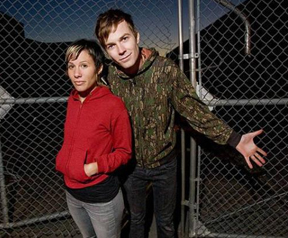
Also in the booklet, it appears a nice collection of pictures of you both. Do you consciously try to escape of this stereotype of “musicians as unreachable people”?
Oh yeah, we have a kind of very big policy for describing ourselves honestly. I think so many bands are concerned with what is cool or what is not cool to be like, or things like that. That is very boring. So we just decided we are going to be ourselves. I know of bands that strap their guitars on and stand in front of the mirror and put the “show look”, like “this is how I am going to look at the show tonight”, and you know, I have never been like that! We are never worried about embarrassing ourselves or anything like that, we just put all on the line and people respond very positively. Playing a show, we are having a good time and we look like we are having a good time! And people say, “I had so much time because you guys looked like you were having so much fun!”. If people look bored on stage, I feel bored watching them.
Certainly this Grand album have put you on the hot spot in many countries, where you have turned to be well known. Do you feel you are now in the right spot you wanted to be when you started to play music?
Well, it is just another situation we put ourselves into. We never make any expectations. We just did this because we like doing it, and we continue doing it because we like doing it. It has been a total surprise to me that it has also been the most financially rewarding thing I have ever done or also that people have appreciated it so much. I just feel that if you say “we will be successful when we hit this point”, then you are setting yourself up for future disappointments. Better to enjoy every little thing and just go along and be constantly satisfied. I would never have expected to make a living of music. I started playing music when I was a teenager, playing punk rock and stuff , and it was just nothing but a expensive habit, something you think you can break but you spend all this money to buy gear and travel the shows and then just lost money.
But does it cross your mind this kind of thoughts like “in 30 years I would love to continue playing music”, or is it more just until the fun ends?
I feel like… well, we kind of swore that whenever became not fun, we would just stop. I know that for some bands, this has just become their jobs and they continue to do it because that is how they do their living and we just never wanted to do something because of that. The day we stop having fun is the day we stop playing. You have to be smart, you cannot overdo yourself and when you have a lot of good opportunities coming your way, you want to take all of them and then you just get yourself burnt out. So we try to be smart about things.
And talking about opportunities… congratulations for the MTV award for best breakthrough video. How do you feel about these kind of awards? You know that some people love MTV, some people hate it…
Well, we have a good relationship with them. They have been cool with us and very supportive of Mat & Kim, in the sense of having us host a show even early on, years ago at the beginning of our career. And well, we have grown up with them, Kim remembers as a little girl watching Madonna videos and things like that on MTV. But I think the great thing about this digital era is that people in Internet can decide by themselves. Things are not available just in one place anymore. People can find things for themselves.
And how was the feeling of shooting the video of Lessons Learnt (where they appear totally naked running around in the middle of the crowd). Were you feeling shy or embarrassed, or were you totally cool with the idea?
In the end it was very liberating. It was very cold when we were shooting it. But after that when we are going to somewhere warm like Miami, I end up buying very small swimming suit, thinking “if I managed to do that video, then I can wear anything!”
Were the people who appear around in the video aware of what was going to happen, or was it totally unexpected for them?
Well, we had a permit that said that we were going to shoot there, but we did not let anyone know, the permit just said “two tourist walk through Times Square inappropriately for the weather…” . It did not say anything of what we were really going to do! It just put us out of trouble, they did not read the full description, they just put a stamp on it, so it is legit… But I was surprise to see the reactions of who was a tourist and who was not, if there was a tourist, they would just take their phone and start taking pictures and the locals were like “ahh, I have seen things like this 10 times already!”
Have you ever talked to Kim about the possibility of having more permanent members in the band, or are you totally comfortable just the two of you?
Well, I think we definitely have a dynamic that it is just Kim and I on stage. It would make some things easier if we would have more instrumentalists there for some complicated parts, we never wanted to play with anything pre-recorded, we do everything live. We did once one show in New York where we had onstage a marching band of 20 people with us. I am in for adding a lot of people, but I think that just adding 1 or 2 would make a strange dynamic. But I am interested in collaborating with different musicians in the future that could add new angles and see what happens.
You will be visiting Finland soon, with a mini-tour of 5 gigs there, and you already sold out 3 of them! Is it your first time playing in Finland?
Yeah, we have never been to Finland. so I was excited being the first time, and then I saw all the dates and I was like “Wow!”. I am a fan of Scandinavia anyway, in Norway and Sweden, we have been up there. We have many places to discover, we have never been to Spain, never been to Italy…
After the current tour, which are your plans for 2010? More work, relaxing a bit…?
It never stops. We have been scheduled out basically until September 2010. After this European tour of 3 months we wanted to take some time off and work on new music, but it won’t come out until the end of summer 2010. Grand came out this year and we were writing these songs in 2007, so this explains how long it take things to happen with this band. I am excited to work on new songs and things like that but well, it is a nonstop work.
Well, but that’s good…!
It is good. Well, sometimes I would like that I could punch the clock and have one evening off, or one week end off…

Q&A with Matt
Favorite drink?
Orange juice.
I thought you would say Bacardi Mojito… (their song Daylight is the official one used in Bacardi Mojito TV ad)
Hehehe, actually no, but apart from orange juice, I have to say Budweiser. Kim is more a Budweiser addict than me. In that we are total Americans. We have been in places with fantastic local beer like Belgium but it is like “do you guys happen to have Budweiser?”
Any special memory from a show you had played?
One very memorable one: we played in an art camp for 8 to 13 year old kids. They all came with such energy! It was very fun.
What city would you choose to live in, if it would be any other than New York?
I think that the quality of the places has to do with the people and friends you meet there. So I would see Chicago, because we have many good friends there.
Best concert you have seen recently?
We were some time ago at a Beyoncé concert, and it was a quite impressive show, so that is the one I remember right now.
For more information, visit:
http://www.myspace.com/mattandkim
http://www.mattandkimmusic.com/
The Wildhearts – 3 gigs in Finland
British rock band The Wildhearts will come back to Finland to play 3 gigs in December, after the release of their new album Chutzpah!
Concerts:
09.12.2009 Tampere, Klubi
10.12.2009 Helsinki, Nosturi
12.12.2009 Joensuu, Karjalatalon Kellari
Gran Torino
I must admit that together with Wes Anderson and a couple more of directors, the old “Dirty Harry” has always been one of my favorite American directors and actors.
What you are going to find here in Gran Torino is essentially a production 100% Clint Eastwood, reminding me of his great masterpiece Unforgiven. He is once more superb in his role of bitter war veteran with a dark past, and in both movies, although the later was a western and this is located in an American suburb invaded by immigrants, have many points in common, as for example the feeling of revenge after the abuse of a woman by a gang.

I know that many spectators would have enjoyed more another final with Eastwood applying his own justice, but the end of Gran Torino is even more amazing as an act of redemption. All along the movie, the great topics are touched: life and death, but between those two, there are many layers to discover in this incredible and prodigious onion; greediness and lack of communication with the sons, racism, religion, redemption, friendship, integration… Eastwood is able to create a cocktail with all this without losing the essence of his cinema, and obviously, in the end, the final is bittersweet, same than life itself.
If you like Eastwood´s movies and you still have not seen Gran Torino, run for it! Another great masterpiece to add to his collection of great titles like Mystic River, Million Dollar Baby, Unforgiven… Mr Eastwood, like the good wines, knows how to taste better and better with the pass of time.
Rating 5/5
{mosimage}The best: The final with Eastwood staring at the house of the criminal gang
The worst: that we are not going to have the chance to see Eastwood in front of the camera much more.
The detail: the same Gran Torino car that appears in the movie was used in the 70s series Starsky & Hutch.
Trailer of Gran Torino
Alexander Stubb – The Naked Truth
Alexander Stubb is a Finnish politician and Minister of Foreign Affairs since April 2008. Before that, he lived and worked in Brussels as a member of the European Parliament. What you find in this book, The Naked Truth, is a collection of his columns for Blue Wings, Finnair’s in-flight magazine. Good and funny reflections about what is to be a Finnish politician in the current Europe!

The book “per se” is totally recommended for the foreigners living in Finland just for the simple fact that WSOY, the publishing company, has had the great idea to publish a version in both English and Finnish; an excellent exercise for some of you who want to practice Finnish and read something interesting at the same time.
Although I do not know Alexander personally, it is easy to imagine him as the stereotypical young and cosmopolitan successful Finnish politician, with his Nokia Communicator and his laptop working with no rest while jumping around the European airports, between Brussels and Helsinki.
{mosimage}
All over his 19 chapters, divided for every one of the columns, written as a kind of blog entry, there is space for about everything: the Finnish and European stereotypes, remarks about how is the every day work at the European Parliament, of comments about his personal hobbies like running marathons or trying triathlons.
It is interesting to see Stubb’s youthful and plain style when explaining things. He does not get lost in much rhetoric and explain things in an easy way for everybody to understand, connecting with the current reality, so you can really feel that he is “one more citizen” who enjoys the same than any other normal person in Finland, rock music, sports, etc… But sometimes, getting to know how Finnish are, a mixture of shyness and pride, you can feel how the protective ideas about everything that is Finnish being as good or better than the products from abroad are still present there.
In any case, the book is very entertaining and useful. Same than Finnish are always curious to catch a glimpse of their country through the eyes of the foreigners, it is also nice to see how Europe is seen through the eyes of a young European politician. I actually miss that the chapters are not a bit longer, and I also do not understand why their order has been altered between the English and the Finnish version. All in all, easy to read, and have to thank Alexander that he has focused more on a light view of life instead of on boring political speeches. But I have a complaint to make. In the last paragraph of the book, he promises to answer personally to every email sent to him. I tried to contact him in order to get some comments for this article… and I am still waiting. So hope you read this and get to contact me Alexander! A promise from a Finnish politician is… still a promise!
Bottle Shock
{mosimage}Love, the eternal rivalry between USA and France…and overall many litres of good wine in this movie based on true events!
As a good Spaniard, I am quite a follower of the wine culture, not an expert, but from time to time I enjoy a bottle of good red wine. So obviously, the plot of this Bottle Shock was promising, with those amazing views of sunny vineyards around California. But the taste that the movie left in my mouth was not graceful at all. Big names and great actors like Alan Rickman or Bill Pullman seem to be wasted in the movie (especially Rickman who does not count with as many minutes on screen as he deserves). The story is more focused around the young friends Gustavo and Bo, and the irruption in their lives of Sam, a sexy female new worker studying the secrets of making wine as intern. But even the love story is twisted. Why the twist in the story, leaving Gustavo? It looks like the old prejudices of Hollywood for presenting multiracial couples are still far from gone.
In the end, you do not learn much about making wine, neither have you felt identified with the characters, and the result is predictable. A pity, because it could have been shaped into a much more interesting movie with a bit more of imagination and better direction.
Rating 2/5
{mosimage}The best: Alan Rickman in the few minutes he is on screen.
The worst: Why the character of Gustavo gets ignored in most of the second half of the movie?
The detail: The main events related in the movie are
The International
{mosimage}An intriguing thriller that will discover the dark secrets of international banking.
I must say that I did not have high expectations for this movie, but I was gladly surprised by an intelligent plot that will keep you hooked to the story until the end. Naomi Watts and overall, Clive Owen, show once more that they can act, apart from just being pretty faces. Ok, it is true that some action scenes like the shooting in the Guggenheim museum, go a bit over the top, but even those scenes have a certain realism and dark humor that fit perfectly with the story.
I also enjoy that in the end there is not the typical moral lesson to learn that appears in most Hollywood movies, and although it is basically an entertaining product, it makes you also reflect about the covered powers that rule the world in the darkness. When there is such a social awareness nowadays to international summits or every time that the FMI gathers together in any part of the world, obviously there is something deep rotten in our society.
A good movie, worthy to watch if you like suspense and smart thrillers spiced with intelligent dialogues here and there.
Rating 4/5
{mosimage}The best: the sharp dialogues between Owen and Watss
The worst: that Naomi Watts could have had a bigger part with his role than just been a mere support for Owen in most parts of the movie.
The detail: Jonas Skarssen speaks Danish with his family in the scenes at home.
Paramore – Brand New Eyes
{mosimage}After the huge success of their previous work, Riot! Here comes the current favorite band of the Emo boys and girls again!
Some years ago, Paramore would have just been catalogued as another young promising American pop-rock band, but it looks like during last year they have really exploded (maybe it had something to do the inclusion of Decode, the last bonus track of this album, in the soundtrack of the infamous film Twilight). So far they have managed to tour around the world headlining, which is a great breakthrough.
What we have here is an album with good and bad sides. One cannot ignore the development (in vocal skills and physically, the girl is becoming a real “hottie icon” for the masses) of the red-haired Hayley Williams. She masters the tempo of the album, screaming when she has to scream and going softer when it is about time to light the candles and lighters for a romantic time. In some ways, Paramore can remind you a bit of previous bands like No Doubt, where the dominating presence of the female vocalist is predominant all over. There are good tracks around the album like Ignorance, the great Playing God or the lovely ballad The Only Exception, but some other songs turn to be a bit boring, like for example Turn it off.
It seems that the band wanted to make everybody happy, both the more hardcore punkers and the emo female teenagers eager to imagine themselves in the middle of the forest surrounded by fairytales like Bella and Edward in Twilight, and in the end the final product is a little bit too much soft and insipid. Not a bad effort though, but it would be nice to see Paramore in a few years when they really create what they want to create without mainstream pressures.
| # | Title | Composer | Length | iTunes |
|---|---|---|---|---|
| 1 | Careful | Hayley Williams and Josh Farro | 3:50 | Download from Amazon |
| 2 | Ignorance | Hayley Williams and Josh Farro | 3:38 | Download from Amazon |
| 3 | Playing God | Williams, Farro, Taylor York | 3:02 | Download from Amazon |
| 4 | Brick by Boring Brick | Hayley Williams and Josh Farro | 4:13 | Download from Amazon |
Rating 3/5
Franklyn
{mosimage}A movie where fantasy and reality gets mixed until converging in a shocking final climax!
I had not idea what to expect before watching Flanklyn, so during the first minutes, as I supposed that happened to many of the watchers, I felt a bit disoriented. Was I watching a version of Roschard in a sci-fic movie, or was I watching a romantic comedy, or what?
But wisely, director Gerald McMorrow, being this only his second long featured movie, knows how to put all the pieces together. Step by Step, you start to realize what is going on during the movie, and certainly it is intelligently built. I just got a bit disappointed with the end, which left me a bit cold. As well, some of the appearances of Eva Green can be a bit annoying.
But although not a masterpiece, certainly Franklyn is something fresh and out of the common movies you can rent in your local video store. It is worth a try, because surely it will not leave you indifferent.
Rating 3/5
{mosimage}The best: Bernard Hill and his quest trying to find his son.
The worst: Some of the characters can seem to be too much stereotypical.
The detail: Many people do not realize until the end that Eva Green plays also the role of Sally.